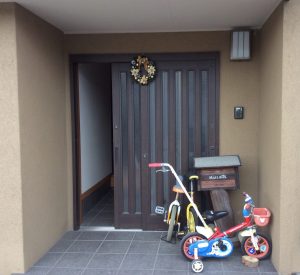
by Tina Marie Ernspiker | Jan 30, 2015 | 2015, Family, Kids, Life Lesson, Mexico, World Motherhood, Younger Children

As a wife of one and a mom of four, it seems like I am always learning and discovering! I know I am not alone. Let’s just admit it: The world is a big place, life is a lesson, and children can be the best teachers. Normally my series, Life Lessons with Mexico Mom, is hosted on Los Gringos Locos, but today I am posting here on World Moms Blog.
Here are my insights and experiences as a Mexico Mom for this week, all taken from a family trip to our local zoo, Parque Zoológico Benito Juárez in Morelia:
Life Lesson 49: Flamingos look fake from a distance. When I spotted them I thought they couldn’t possibly be real. They were still as statues and their color is a vibrant peach. The flamingos were elegantly and perfectly formed. What a beautiful creation for us to enjoy! It turns out these birds were the real thing. Mommy was in awe over their beauty and I still am.
Life Lesson 50: I have no idea how to row a boat. I was the star of a real life comedy show called Mommy is Goofy. Just kidding… but I know that everyone who was watching must have had at least one laugh from my performance. We were going in circles for a while and when we started to move I hit at least three or four boats. I think we might have made it 50 feet before we had to turn around and come back to shore. All persons aboard survived.
Life Lesson 51: Petting a six month old tiger is amazing. We were able to do this along with our four kids. I think we were all in animal paradise. Her name is Esperanza which mean ‘hope’ in English. She was gorgeous and soft. Who would have known a tiger is soft! Esperanza is only six months old and her paws are the size of my hands. She was born in captivity and is well-cared for. She also has a hyena cub as a friend. They play tug of war and are quite a match for each other. Unforgettable!
BONUS – Life Lesson 52: Three grizzly bears standing eight feet tall is a sight to see. Their trainer was feeding them bread which apparently they love. But he would only throw a loaf when they stood tall. One of the loaves went into the water and the biggest bear went right in after it. What a cool ending to a wonderful family day at the Morelia Zoo in Michoacan, Mexico 🙂
What life lesson did you learn this past week? Please share it with us below. We want to hear your thoughts from around the world!
This is an original post to World Moms Blog by Tina Marie Ernspiker. Tina can be found blogging over at Los Gringos Locos. She is also on Facebook and Twitter.
Photo credit to the author.

by Tara Bergman (USA) | Jan 23, 2015 | 2015, Boys, Family, Humor, Husband, Kids, Life Balance, Motherhood, Parenting, Tara B., USA, World Motherhood, Younger Children

Since having children, my husband and I have developed our own household lingo. Maybe we just got punchy after too many sleepless nights, but we started using code words. Also, as can happen from time spent living intimately with a group, our family has developed a repertoire of inside jokes that we reference often but would mean nothing to outsiders.
Today I share with you a few of my favorites from the past 10 years. (more…)
Tara is a native Pennsylvanian who moved to the Seattle area in 1998 (sight unseen) with her husband to start their grand life adventure together. Despite the difficult fact that their family is a plane ride away, the couple fell in love with the Pacific Northwest and have put down roots. They have 2 super charged little boys and recently moved out of the Seattle suburbs further east into the country, trading in a Starbucks on every corner for coyotes in the backyard. Tara loves the outdoors (hiking, biking, camping). And, when her family isn't out in nature, they are hunkered down at home with friends, sharing a meal, playing games, and generally having fun. She loves being a stay-at-home mom and sharing her experiences on World Moms Network!
More Posts

by Nadege Nicoll | Jan 15, 2015 | 2015, Awareness, Communication, Cultural Differences, Family, France, Girls, Global Citizenship, Humanity, International, Loss of Child, Motherhood, Nadege Nicoll, News, Older Children, Parenting, Terrorism, World Events, World Motherhood, Younger Children

A year ago, girls, teenagers who wanted an education so they could look forward to a great future, were abducted from their school in Chibok, Nigeria. They were taken away, kidnapped and removed from their family, because they were guilty of having ambitions. All these girls had to defend themselves were books.
What’s left of this horror is parents. Mothers and fathers, grieving for a loss that can never be overcome, hurting from a pain that will never lessen, left to wonder why, and knowing that no answer will ever alleviate their sorrow. Because there is no justification.
A few months ago, Peshawar happened and with it, the world once again, lost its innocence. Over 150 kids massacred, because they were guilty of being the children of their parents. All these kids had to defend themselves were notepads.
What’s left of this horror is parents. Mothers and fathers, grieving for a loss that can never be overcome, hurting from a pain that will never lessen, left to wonder why, and knowing that no answer will alleviate their sorrow. Because there is no justification.
Last week, my home country, France, was the theatre of repeated terrorist attacks. People were massacred because they went to work that day, or decided to do their grocery shopping. A brutal attack, with one side holding weapons, the other pencils.
And the violence continued with news of over 2000 killed in Baga, Nigeria.
What’s left of this horror is parents. Mothers, fathers, grieving for a loss that can never be overcome, hurting from a pain that will never lessen, left to wonder why, and knowing that no answer will ever alleviate their sorrow. Because there is no justification.
Mothers, fathers of this world, our families are being hurt beyond comprehension. Pencils are fighting bombs, words are matched with weapons. These violent attacks are not about gender, race, religion, background, or opinions. They are about pulverizing families. This is a call to unite. We all have a responsibility to do everything in our power to preserve our families and help others do the same.
We are all Chibok girls. We are all Peshawar. We are all Charlie.
How do we, global parents everywhere, teach our children to cherish and preserve their families? How do we unite to show them that violence is never the answer?
This is an original post to World Moms Blog by Nadege Nicoll. She was born in France but now lives permanently in New Jersey with her family. Nadege also writes a daily blog for moms who need to smile at everyday life. She can be found on Twitter, Facebook and her website www.nadegenicoll.com.
Image creation by author.
Nadege Nicoll was born in France but now lives permanently in New Jersey with her family. She stopped working in the corporate world to raise her three children and multiple pets, thus secretly gathering material for her books. She writes humorous fictions for kids aged 8 to 12. She published her first chapter book, “Living with Grown-Ups: Raising Parents” in March 2013. Her second volume in the series just came out in October 2013. “Living with Grown-Ups: Duties and Responsibilities” Both books take an amusing look at parents’ inconsistent behaviors, seen from the perspective of kids. Nadege hopes that with her work, children will embrace reading and adults will re-discover the children side of parenthood. Nadege has a few more volumes ready to print, so watch this space…
More Posts - Website
Follow Me:



by Melanie Oda (Japan) | Jan 8, 2015 | 2014, Awareness, Child Care, Childhood, Culture, Domesticity, Education, Expat Life, Eye on Culture, Family, Feminism, Grandparent, Home, Husband, International, Japan, Life, Life Lesson, Living Abroad, Marriage, Me-Time, Motherhood, Multicultural, Parent Care, Parenting, Priorities, Relationships, Responsibility, School, Social Equality, Womanhood, Women's Rights, World Motherhood, Younger Children
 Gender equality has been in the news quite a bit in Japan recently, sort of, and some things have happened closer to home that have me thinking.
Gender equality has been in the news quite a bit in Japan recently, sort of, and some things have happened closer to home that have me thinking.
It started when a (female) Tokyo assembly member was heckled in a sexist way. Then Prime Minister Abe introduced some new policies to let women “shine.” (He needs to get them doing something for the economy.) He even appointed several women to cabinet posts, for about five minutes, until they were slapped back down into their places over minor scandals.
In Japan, people are talking more about issues women face but no one seems to be doing much about them.
(Lest I forget: strangely enough, the declining birth rate is treated as a “women’s issue.” I seem to remember my husband being involved, too.)
I never considered myself a feminist growing up. Some members of the evangelical, conservative community I grew up in doubtless felt “feminist” was a new version of the “F-word.”
OK, so I went to a high school with more sports options for boys than girls. And yes, girls were encouraged to take chorus and home economics instead of woodworking or mechanics. So maybe I heard men from my community refer to grown women as “broads” or “gals.” There also were some restrictions at church regarding women’s and men’s roles. But I never felt that possessing certain types of baby-making parts limited my potential.
Then I moved to Japan, where gender roles are more firmly entrenched and my way of thinking slowly changed.
As I get older, and because I am a mother, I find that I am limited in ways that I couldn’t have foreseen as a young girl.
Some people may find life here in Japan freeing. If you aspire to be a homemaker a la Martha Stewart, then your life’s work would be very much respected and appreciated here. My husband wouldn’t bat an eyelid if he came home to a messy house because I’d spent the day at a preschool mothers’ lunch. He knows that is part of the job (on the other hand, it would never occur to him to pick up the mess himself.)
If, as a woman, you have other aspirations, Japanese culture seems designed to work against you. The glass ceiling is very much in tact. On the news here you do hear issues like lack of childcare and “maternity harassment” being addressed. But what gets talked about less often is that to many women, including myself, it feels as if there’s a glass door as well.
It’s my front door.
Before a woman can even think about what is facing her out in the world, she needs to address the forces that are keeping her at home. Some of these are practical, some are logistical, some are cultural and perhaps peculiar to Japan and it’s work culture.
For me, it starts with my husband: He leaves home at 7am every morning, but I have no idea what time he will be back. Sometimes it’s 7pm. Sometimes it’s midnight. He may be in the office that day, or he may suddenly be sent to another prefecture. He’s made international trips on 12 hours notice. I cannot depend on him being home at a designated time, by no fault of his own. The idea of him taking time off with a sick child is preposterous in the extreme.
I have been lucky enough to have two job offers recently, both of which would be more or less during school hours, but neither is nearby. If a child were to get sick and need picking up, or if god-forbid there was a natural disaster (which is always in the back of your mind if you are a mother in Japan,) then my husband would be closer. I mentioned that, and he completely shot me down. Not just the idea of him picking up the kids in case of an emergency, but the idea of a job anywhere outside of cycling distance from the school.
We live in a residential neighborhood. I patch together some part-time work here and there, but it’s not like there are loads of professional opportunities in a two kilometer radius.
I suddenly felt very limited, penned in, in a way I haven’t felt before. The glass door was slamming in my face.
I don’t think I’m alone in this conundrum. Go to almost any supermarket in a residential area during the day, and you will see women in their prime working years manning the register. Many of these women have university degrees. Many have licenses and qualifications to be doing other kinds of work, but they want to stay close to home. They also need salaries to stay under $10,000 year or face a peculiar Japanese tax code and insurance system that penalizes families where both partners have incomes over that amount.
Then there are my kids: Like 2/3 of Japanese women with children under 6, I stayed home when they were small. They now completely depend on me for everything. It seems to have never entered their minds that someone else could give them a bath or help them find their missing socks, mostly because no one else has ever done anything for them. Especially when they are sick, they want only me. It was very hard when my daughter was in the hospital, both children wanting to be with me and emphatic that no one else would do.
But now my youngest is in elementary school, and I would like to just be doing more of something….else, but for me to plunge into the workforce would be a huge adjustment for my children. Is it worth the stress? Can we survive what is sure to be a painful adjustment period?
Maybe if I had more family support, it would feel less impossible but as it is, it seems like everyone is against me.
Which brings me to the final characters in this comedy, my in-laws: They say they’ll watch the kids, then they change their minds. Or something better comes up. From their point of view, this house and these people are completely my responsibility. Anything they do is extra credit.
To be honest, we’re getting to the point where my in-laws need my help more than I need theirs.
They aren’t shy about letting me know my place.
One day not too long ago, my son was playing at the park with his friends. It was getting close to homework time, so I called him and told him to come home. He said he was playing with Jiji (which is an endearing term for grandfather used in our region of Japan,) and could he play for a bit longer? Since he was out with an adult, I said okay.
The next day, I got a verbal whipping from my father-in-law over the phone, accusing me of being irresponsible, a bad mother. It took me a few minutes to understand why he was saying this, but when I got to the bottom of it, I realized my son had lied to me. He was playing with his friends when Jiji walked by and told him to go home. My son told him I wasn’t at home and said he couldn’t come back until I did. (I must have called right at this point.) “How dare you not be home in the afternoon?” said Jiji.
Putting aside that none of this nonsense was true, so what if I wasn’t home in the afternoon? Of course I wouldn’t have left the kids to wander the neighborhood like stray dogs, but why was my not physically being inside my house such an issue to him? His assumption that it was my duty to be always available to everyone took me by surprise.
I could almost hear the glass door slamming again.
There are also other barriers for women in Japan—an over active PTA for one, and a myriad of community responsibilities attended to exclusively by women for another. I imagine most women in the world encounter both the “glass door” and the “glass ceiling” in some form or another, but in Japan only one of these factors is seems to be getting much attention. Building new daycare facilities isn’t enough; the government stating goals to increase women’s participation in the workforce isn’t enough. Until we do something about that glass door, nothing will change for one of the best educated, least utilized group of women in the world.
Do you feel you are fulfilling your potential, both at work and at home? What’s the situation like in your country?
This is an original post for World Moms Blog from our writer and mother of two in Japan, Melanie Oda.
If you ask Melanie Oda where she is from, she will answer "Georgia." (Unless you ask her in Japanese. Then she will say "America.") It sounds nice, and it's a one-word answer, which is what most people expect. The truth is more complex. She moved around several small towns in the south growing up. Such is life when your father is a Southern Baptist preacher of the hellfire and brimstone variety.
She came to Japan in 2000 as an assistant language teacher, and has never managed to leave. She currently resides in Yokohama, on the outskirts of Tokyo (but please don't tell anyone she described it that way! Citizens of Yokohama have a lot of pride). No one is more surprised to find her here, married to a Japanese man and with two bilingual children (aged four and seven), than herself. And possibly her mother.
You can read more about her misadventures in Asia on her blog, HamakkoMommy.
More Posts

by Meredith (USA) | Dec 12, 2014 | 2014, Awareness, Communication, Cooking, Family, Home, Kids, Motherhood, Parenting, USA, World Motherhood, Younger Children

Last week as I was driving my children to school, my son asked me out of the blue “Mom, what do you do all day when we are at school?” My daughter chimed in with,” Yeah…what DO you do all day?” (more…)
Meredith finds it difficult to tell anyone where she is from exactly! She grew up in several states, but mainly Illinois. She has a Bachelor of Science degree in Elementary Education from the University of Illinois at Champaign/Urbana which is also where she met her husband. She taught kindergarten for seven years before she adopted her son from Guatemala and then gave birth to her daughter two years leter. She moved to Lagos, Nigeria with her husband and two children in July 2009 for her husband's work. She and her family moved back to the U.S.this summer(August 2012) and are adjusting to life back in the U.S. You can read more about her life in Lagos and her adjustment to being back on her blog: We Found Happiness.
More Posts

by Katinka | Dec 1, 2014 | Adoption, Adoptive Parents, Belgium, World Motherhood, Younger Children
 In preparation for our adoption, we had to take an intensive course, dealing with the many dynamics involved. A while later, our gained knowledge, but also our personal history, relationship, parenting skills and social network were scrutinized by a social worker and a psychologist.
In preparation for our adoption, we had to take an intensive course, dealing with the many dynamics involved. A while later, our gained knowledge, but also our personal history, relationship, parenting skills and social network were scrutinized by a social worker and a psychologist.
During those months and months of preparation, there are two statements that came up several times and which I will always remember:
1) Having children is NOT a universal human right. Having a parent – or a dedicated caregiver – IS.
In other words: We were not entitled to a child. It’s the child’s benefit that comes first at all times. A hard lesson to learn for some, and next to impossible to swallow when the judge doesn’t give you the much hoped for green light. But true nonetheless.
2) We were NOT judged for our parenting skills. We were judged for our ADOPTIVE-parenting skills.
Especially to couples that were already parents, the course and social exams could be seen as an affront. And yes, it could be quite provoking and private at times. But in our case is was also very respectful at all times, and educating as well. And it was necessary.
Why? Because adopted children come with a backpack filled with their history. Because, as an adoptive parent, you might need to help carry that backpack.
A central topic to both the course and the exam was: attachment, and with that, basic trust. It was explained to us beautifully by ‘The parable of the little sailor’, in which a child is at first safely on a boat. All of a sudden, she finds herself in a storm. The boat sinks and she struggles to survive. When next she is picked up by a new boat, full of small children like her, and a new captain, it takes a while before she believes that the captain will keep them safe. And she proved right to be hesitant, because a new storm comes up and eventually, that boat also sinks. The child is alone again. From that point on, the child decides to not trust any captains any more. So when a new boat arrives, she goes in hesitantly, because she has no other choice. But she will keep her guards up for a long time now. She will test the captain’s sailing skills over and over again, and whenever a storm comes, she will be ready to take over control.
Some adopted children will have experienced more boats, more caregivers, than others. Some will have had worse storms than others. In quite some cases, gaining the trust of that little sailor will be a tremendous task for the final captains of its journey, the adoptive parents.
Attachment disorder can be an overwhelming Damocles’ sword that hangs above an adoptive family.
We were told the best way to avoid attachment disorder, was to make sure we were going to be the only captains during our precious sailor’s first months on our boat. A minimum of six months of semi-isolation, they recommended. Ideally not letting anyone else take care of her, not even hand her gifts. After that, the time she would need to safely attach to us and rely on us to steer the boat, was estimated as her age upon adoption, multiplied by two.
Our daughter was 2.5 years old when she came to live with us, and she’s been with us for three years now. That means we still have at least 2 years to go for her to let go of her anxieties and mistrust.
At least 2 years. Probably longer, if we look at where she is today on her journey towards trust and attachment. I personally believe attachment, at least for our daughter, will be a constantly evolving process for many years to come.
We’ve also had our share of storms. For one, we broke her trust those first, crucial months. You see, in Belgium, maternity leave is fairly short, only 15 weeks. When adopting, it’s even less. We were ‘lucky’ to adopt when our girl hadn’t reached the age of 3 yet, so I got to stay at home with her for 6 weeks. When your child is older, you only get 4 weeks. Or zero weeks, when the child has reached the age of 8, or when you’re a foster parent… So, a maximum of 6 weeks to complete this huge task of gaining trust. It’s extremely frustrating to have been pressed repeatedly on the importance of a strong basis for attachment and then being forced to send that little sailor off to another captain, one in the boat of day care or kindergarten, after a mere 6 weeks or less.
There have been quite some voices and petitions these lasts months, to once and for all equalize maternity leave rules for all sorts of parenthood, including adoption and foster care. The old statement of ‘You don’t need physical recovery from adoption like you do from giving birth, so you don’t need the same amount of time’ has lost its validity the moment regular maternity leave was extended with an additional (unpaid) month, for the sake of ‘bonding of mother and child’.
No need to say the adoptive community was outraged, or at least strongly disappointed at that time. We still are. The adversaries of our request don’t seem to understand that we don’t ask longer maternity leave for ourselves, although I must admit that some time for emotional recovery would have been very welcome in those first, stormy months.
But essentially, we request it for the benefit of the little sailors to come. They deserve more time to explore, defy and scrutinize their new captains.
How long is maternity leave in your country? Is the same for all kinds of parenthood? And how long do you believe it should be?
This is an original post to World Moms Blog by K10K from The Penguin and The Panther.
Photo by Alejandro Groenewold under Creative Common license
If you ask her about her daytime job, Katinka will tell you all about the challenge of studying the fate of radioactive substances in the deep subsurface. Her most demanding and rewarding job however is raising four kids together with five other parents, each with their own quirks, wishes and (dis)abilities. As parenting and especially co-parenting involves a lot of letting go, she finds herself singing the theme song to Frozen over and over again, even when the kids are not even there...
More Posts
























